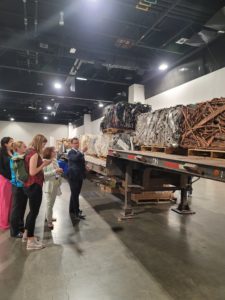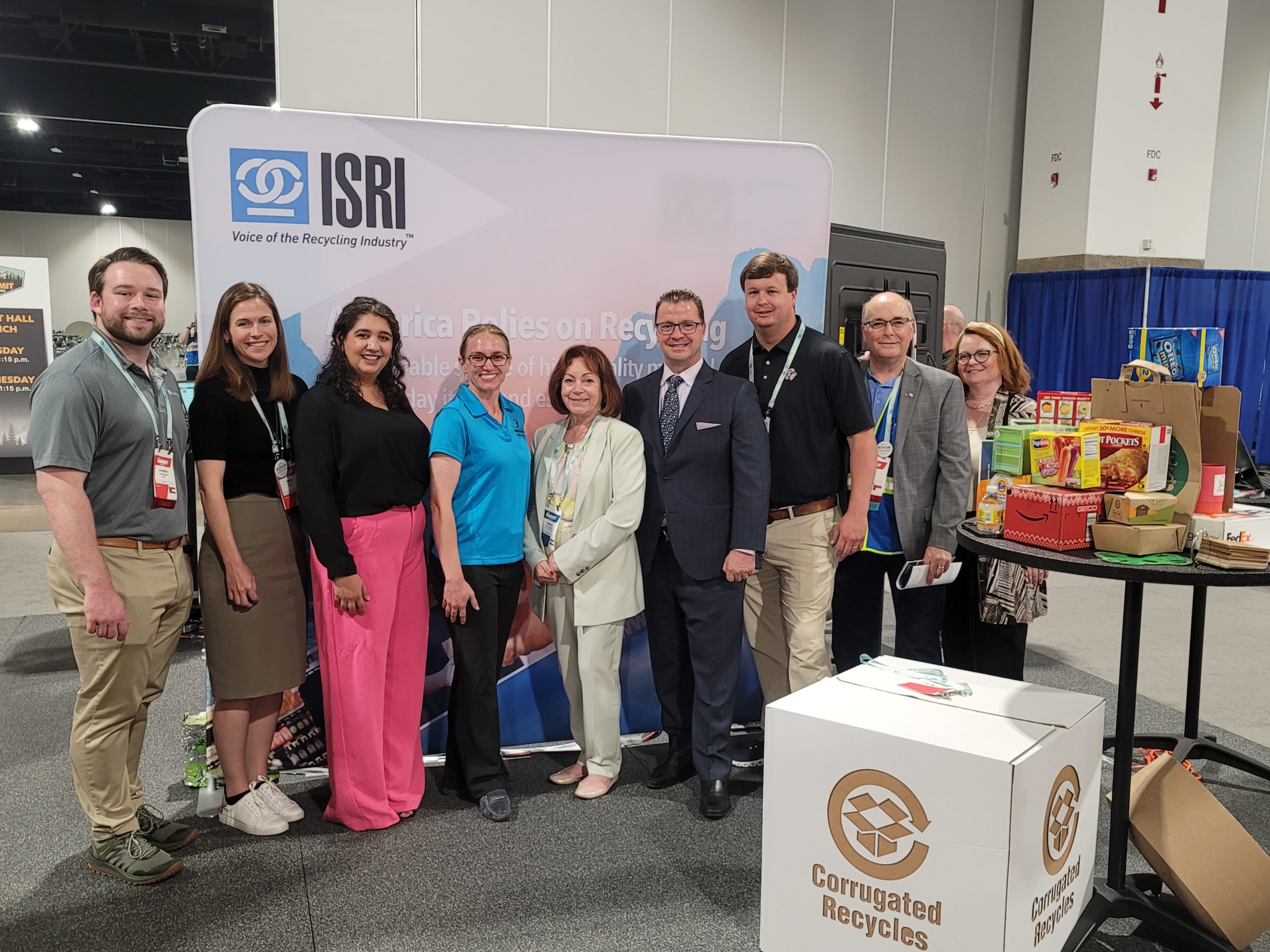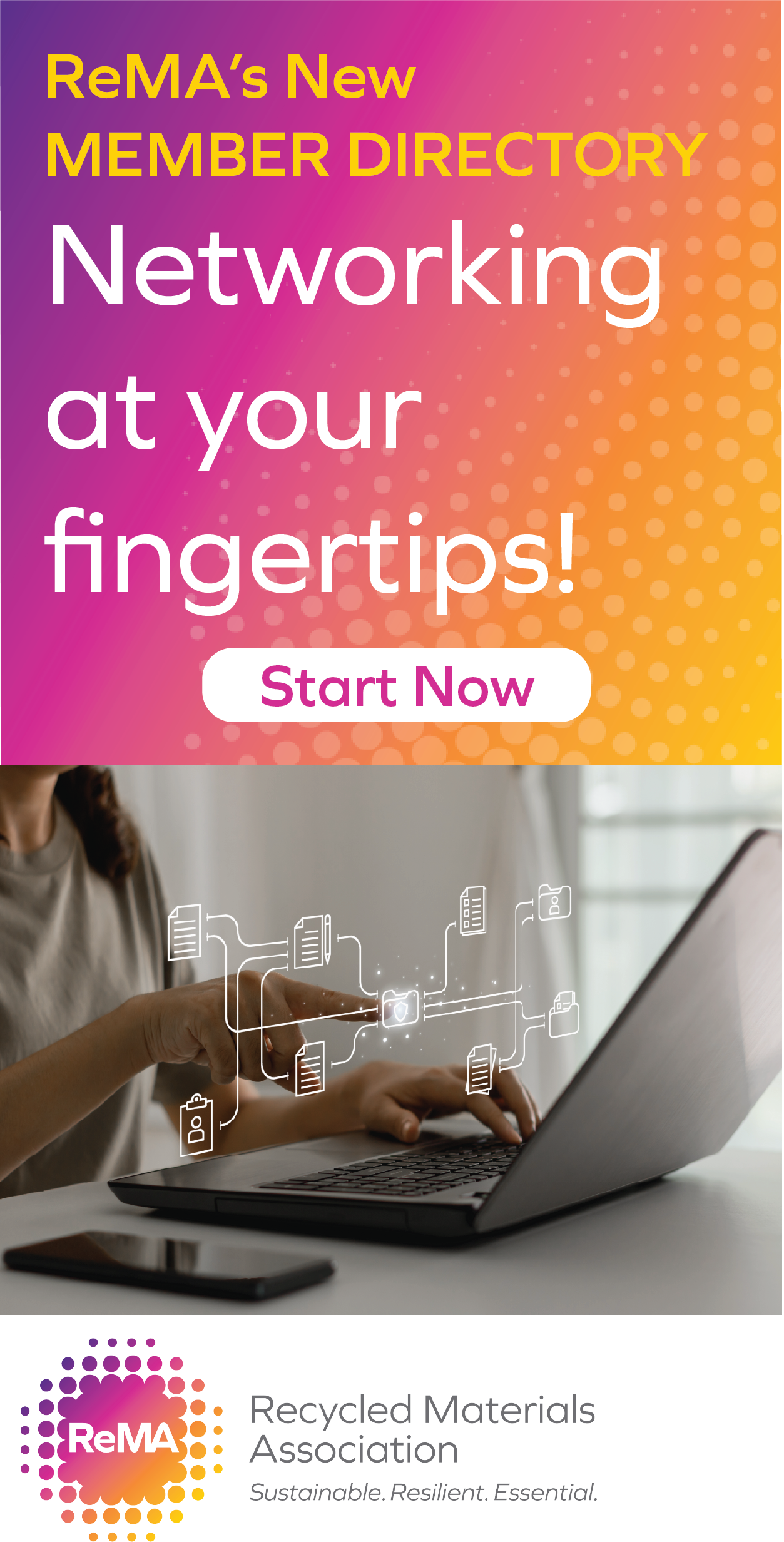Longstanding connections between recyclers and policymakers can start from anything. Even something as small as a plastic butter tub.
In July, while attending the 2022 National Lieutenant Governors Association (NLGA) annual meeting in Chicago, Danielle Waterfield, ISRI’s chief policy officer, found herself at a table with Colorado Lt. Gov. Dianne Primavera. ISRI had just presented the annual Recycling Impact Award and held a sustainability workshop, so recycling was on everyone’s minds.
 Primavera and Waterfield fell into a discussion about recycling where Primavera asked a lot of questions, particularly about an item in her home. “She wanted to know more about plastics recycling, and whether her butter tubs could be recycled,” Waterfield recalls.
Primavera and Waterfield fell into a discussion about recycling where Primavera asked a lot of questions, particularly about an item in her home. “She wanted to know more about plastics recycling, and whether her butter tubs could be recycled,” Waterfield recalls.
Waterfield told Primavera ISRI members could answer her questions at the National Conference of State Legislatures (NCSL) Legislative Summit in August in Denver. At the NCSL Summit Primavera would get an up-close view into recycling and get to the bottom of the butter tubs.
“The NCSL Summit is an opportunity to bring recycling facilities to legislators at their own convention. We educate them about the industry by showing them life-size bales, recycling equipment, and anything we can fit into the exhibit hall,” Waterfield explains.
An Engaging Luncheon
In addition to a booth, ISRI sponsors a luncheon at the NCSL Summit where ISRI members get the chance to talk to state policymakers. “They sit down and engage,” Waterfield says. “It’s an opportunity for legislators to connect with ISRI members as constituents. They come away knowing that ISRI and recyclers are a valuable source of information.”
 When Primavera and her staff arrived at the NCSL Summit their first stop was lunch and a meeting with ISRI Chair Brian Henesey, whose company, Rocky Mountain Recycling, is adjacent to Denver in Commerce City, Colo., and other ISRI members and leadership. “Brian introduced the other Colorado recyclers at the table as her constituents,” Waterfield says. It helped break the ice and illustrate where recyclers were located throughout the state and the commodities they represented.
When Primavera and her staff arrived at the NCSL Summit their first stop was lunch and a meeting with ISRI Chair Brian Henesey, whose company, Rocky Mountain Recycling, is adjacent to Denver in Commerce City, Colo., and other ISRI members and leadership. “Brian introduced the other Colorado recyclers at the table as her constituents,” Waterfield says. It helped break the ice and illustrate where recyclers were located throughout the state and the commodities they represented.
Some people at the table represented areas of the industry in which Primavera was particularly interested. Emily Ham from WestRock shared how her company’s cardboard manufacturing operations in Denver relied on recycled paper fibers. Will Drinkard, from KW Plastics, addressed the false myth that butter tubs are not recyclable.
Also at the table were Komie Jain, ISRI’s senior vice president of advocacy, and Cheryl Coleman, ISRI’s senior vice president of sustainability. They provided Primavera with a broad picture of the scope and depth of the industry. “We had great diversity at the table,” Waterfield says. “Our industry is run by everyday people who contribute to and care about the communities in which they work and live.”
Jain recalls that Primavera seemed struck by learning that many of the recyclers around her were from multigenerational, family-owned companies. “Two of the young women talked about how they were [part of the] third generation in the business. I think that resonated with the Lieutenant Governor,” Jain says. “Primavera was highly engaged during the luncheon and seemed pleased to learn of the recycling efforts and businesses in Colorado. I think we have quite a supporter.”
Commodities on Display
After lunch, Waterfield and ISRI members led Primavera through the exhibits. “At the ferrous section, Sarah Willcutts [manager at Greeley, Colo.-based Andersen’s Sales & Salvage] explained the process that the crushed vehicle we had on the trailer would go through to be transformed into raw products for manufacturing,” Waterfield says.
 Primavera was eager to visit the tire recycling exhibit to learn more about how the tire recycling industry was helping Colorado solve its used tire problem. “Primavera asked questions, to which we had some great back and forth, and there was a discussion with the owner of a start-up manufacturer about displays of highway barriers made in Denver from recycled tire products supplied by ISRI members,” Waterfield adds.
Primavera was eager to visit the tire recycling exhibit to learn more about how the tire recycling industry was helping Colorado solve its used tire problem. “Primavera asked questions, to which we had some great back and forth, and there was a discussion with the owner of a start-up manufacturer about displays of highway barriers made in Denver from recycled tire products supplied by ISRI members,” Waterfield adds.
Primavera had a long conversation with Drinkard and learned more about the butter tubs that sparked her initial curiosity. Though butter tubs are not among the plastics collected by her local recyclers, Drinkard said that plastic is recyclable and a valuable commodity for KW Plastics.
“That’s something legislators may miss: Not every locality takes the same recyclables,” Jain explains. “Different materials recovery facilities (MRFs) can process different materials. It’s not a one-size-fits-all situation. Through our work and education efforts, we want to shine a light on this issue to legislators.”
Waterfield agrees. “Policymakers often focus on residential recycling and are told that certain materials aren’t recyclable,” she says. At the NCSL Summit, legislators can hear directly from ISRI members about the business of recycling.
 “Lawmakers can learn from our members that while some of those materials, like the butter tubs, are recyclable, the residential recycling challenges create a patchwork system that prevent many municipalities from collecting and processing the butter tubs,” Waterfield says.
“Lawmakers can learn from our members that while some of those materials, like the butter tubs, are recyclable, the residential recycling challenges create a patchwork system that prevent many municipalities from collecting and processing the butter tubs,” Waterfield says.
ISRI is using its outreach through NCSL to continue this communication between ISRI members and policymakers to get across these critical industry messages.
“It was great for the lieutenant governor to hear the challenges behind getting her butter tub recycled,” says Waterfield. “But it was even better for her to hear it directly from a plastics recycler who could follow that up with a positive message of how [their] company wants the plastic in that tub for established end markets.”
Following these discussions, ISRI members took Primavera to a large trailer with a mixed display of commodities ISRI members handle. The trailer showcased in real-scale size how ISRI members of all commodities are in the business of recycling on which America relies for everyday items and essential infrastructure.
A History of Success
ISRI members have a great history of forging connections with legislators at the NCSL Summit. At last year’s summit in Tampa, Fla., a Washington state legislator approached ISRI with questions about catalytic converters for a bill she was drafting. “She took our suggestions and enacted legislation that included ISRI language,” Waterfield says.
This year, a South Dakota state senator spoke with ISRI Chair-Elect Collin Kelly at the luncheon about catalytic converter legislation and left with a better understanding of the issue. “Legislators look forward to seeing our exhibit each year,” Waterfield says. “We’re excited to hear that they learn a lot about the industry they didn’t know before.”
Initial Follow Up
ISRI is already following up with Primavera about her experience at the NCSL Summit. This time it’s about a bench.

Part of ISRI’s exhibit includes contests where participants guess at commodity-related trivia questions and win prizes. Two favorite contests every year involve counting how many cans are in a bale of crushed aluminum and guessing at a recycled rubber trivia question.
The winner of the trivia contest receives a park bench made from recycled tires that is constructed and provided by ISRI member Champlin Tire Recycling. This year Primavera won the bench.
“When we emailed her about the contest, we also sent her the Colorado economic jobs fact sheet and information about the recycling facility tours we held during the NCSL Summit,” Waterfield says. Primavera was unable to attend the tours that week, so Waterfield offered to help facilitate tours if Primavera’s scheduled allowed.
“Through her experiences at the NCSL Summit, Primavera saw that ISRI members are true experts in their field,” Waterfield says. “She saw that ISRI is truly the voice of the recycling industry and an important resource for her when she needs a credible source of information on policy matters related to recycling.”
Photos Courtesy of ISRI.










